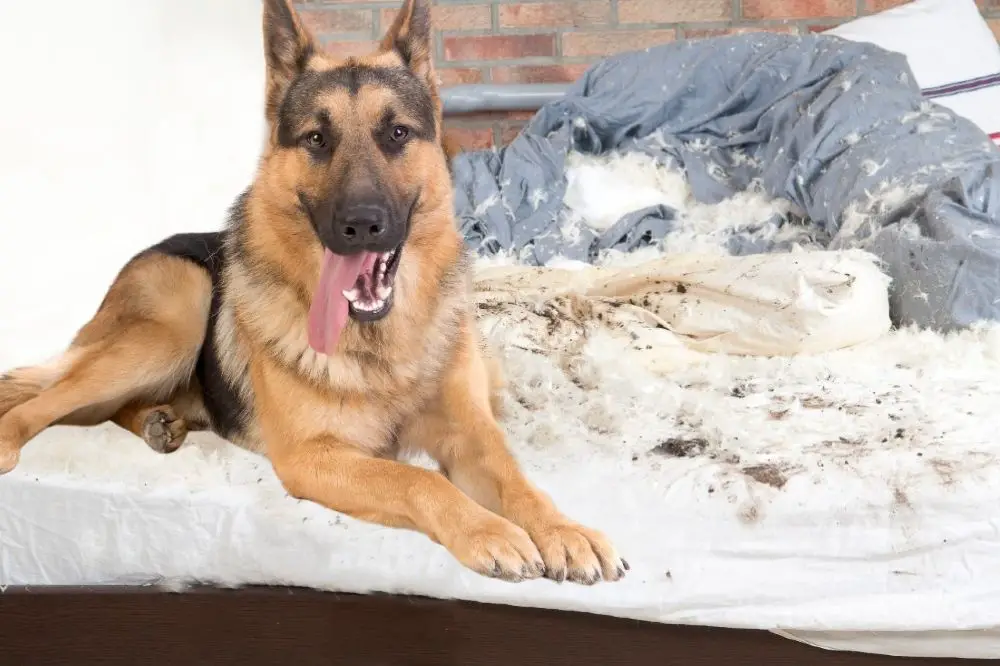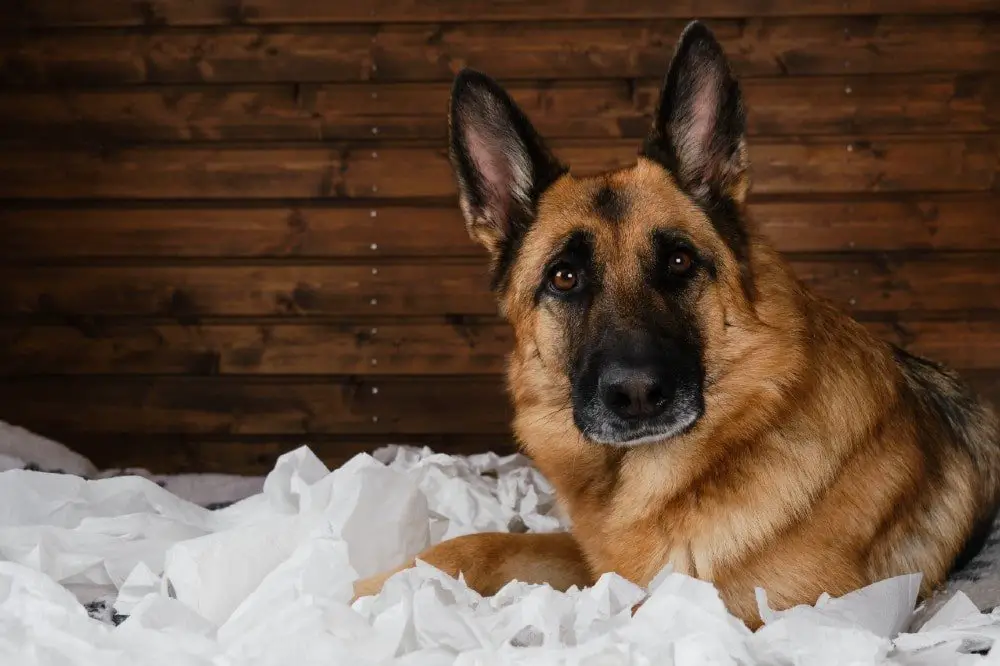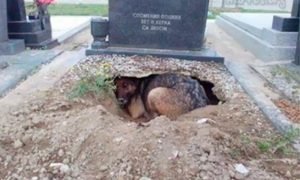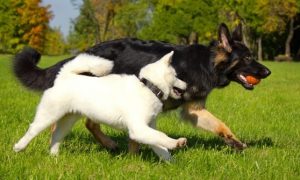Why dogs dig in beds and furniture is a common question and problem for dog owners of all dog breeds, ages, and sizes.
The digging behavior may start as a puppy or suddenly appear out of the blue later in life. It can be frustrating and costly for owners.
If you have a dog that has started to shred its bedding, your bedding, or furniture, they aren’t doing it on purpose to upset you. Also, know that you have not done anything to trigger this dog behavior.
Dogs that circle, scratch, dig, and roll around on beds, floors, blankets, etc., are performing pre-sleep rituals. This instinctive behavior is known as nesting or denning and is a perfectly normal bedtime routine.
A dog ready to settle down for a nap may circle the area repeatedly before laying down. Instinctively they are clearing out, protecting, and marking their sleeping area.
Circling is a harmless self-preservation method that may seem silly to humans, but let them do it if it makes your dog happy. (Pick your battles.)
Some dogs have a thing for blankets. They like to bunch up the blankets with their paws to lay on, while others want to burrow under the blankets and hide. This might seem like play, but it’s, again, instinctual behavior.
Dogs scratching or pawing on carpet or tile floors may not be a big deal. However, problems occur when the pawing and scratching damage hardwood floors, or the behavior turns into digging and shredding expensive dog beds, comforters, blankets, your bed, or cushions on furniture.
Why Dogs Dig in Beds and Furniture
1. Natural Instinct
Our dog’s ancestors used their paws to gather dirt, grass, piles of leaves, and pine needles to create a resting place. Digging and circling would shift the items collected into a more comfortable space to sleep.
Digging and gathering in their safe space could also be used as protection and concealment from predators.
Digging a shallow hole or finding cover under leaves or foliage helped protect and shelter them from harsh winter weather and extreme summer temperatures.
Today’s domesticated dogs still retain the instincts of their wild ancestors. That’s why dogs like to:
- Dig holes in soft ground to lay in on hot summer days or in hot climates
- Circle repeatedly before laying down
- Like hiding under blankets
- May prefer a cramped, dark place to sleep versus a comfortable sleeping area
2. Territorial Behavior
A dog marking its territory is another primal instinct found in modern dogs.
Male dogs are known for urinating on everything to leave their scent as a calling card. However, dogs have scent glands in their paws that contain their unique smell.
Dogs that paw, scratch, or dig in bedding or furniture are releasing their scent. You see a shredded item, but your dog has happily claimed and marked the bedding, blanket, cushion, or favorite toys as their own.
Some dogs may start bed and furniture digging behavior when a new pet is brought into the home, or a significant disruption occurs like moving to a new house or a family member’s death.
3. Maternal Instinct
A female dog about to deliver puppies will instinctively begin to paw, scratch or dig in her surroundings. Her maternal instincts are a hormonal response to create a comfortable place to keep her pups warm and protected.
If you see a pregnant dog or your pregnant girl exhibiting this common behavior, leave her be, and it’s a good idea to get ready because puppies are coming soon.
4. CopyCat Behavior
Territorial behavior is an established dog who starts circling, pawing, scratching, or digging bedding or furniture when a new animal like a cat or another dog or pup is brought into the pack structure of the home.
A new dog or pup may copy the behavior. This copycat behavior is nothing to be concerned about as it is normal behavior for dogs to mimic their four-legged siblings or playmates, especially if it gets them attention.
5. Hiding Treasure
Are you finding your dog’s toys, chews, stolen socks, or other prized possessions under disheveled cushions strewn about blankets or pillows? This is your dog’s instinct to bury or hide something they consider valuable.
These antics fall under the territorial behavior mentioned above and are more commonly observed in homes with multiple dogs.
6. Health Reasons
Constant digging or excessive circling is anxious behavior that might indicate a health issue. A dog suffering in pain may circle or dig obsessively before laying down, hoping to find the right spot to help ease the pain.
Pay attention if your dog is elderly, your dog hasn’t dug or circled in the past, or your dogs digging or circling behavior ramps up and is accompanied by whining, licking, chewing, panting, or other behaviors that aren’t normal. Seek veterinarian advice as needed.
How to Manage Dogs Pawing and Scratching Bedding and Furniture
If your dog’s scratching or pawing behavior is not destructive, you may want to manage it rather than try to stop it. Here are some suggestions:
- Keep your dog’s nails trimmed
- Provide more dog beds or throw rugs throughout your house
- Add a blanket to their designated sleep area or bed
- Add blankets or covers to furniture your dog is allowed on
- Move their primary bed to a private area away from loud noise
How to Stop Dogs Digging in their Bed, Your Bed, and Furniture
If your dog is digging and shredding bedding or furniture, this is destructive behavior that needs to be dealt with. Ignoring it will not make it go away.
If you catch your dog in the act of destruction, give them a stern no and place them in a time-out for unwanted behavior.
*Time Out* = 10 minutes of a down-stay or 10 minutes of crate time.
If you miss your dog in the act of destruction, you can verbally let them know you are displeased and make them watch you clean up the mess.
If your dog has destroyed their bed, don’t replace it immediately. Give your dog some tough love by designating a beach towel as their new bed for a few days to a few weeks.
When you replace your dog’s bed with a new one, they are only allowed access to it under supervision. Because your dog has a record of digging, do not let them paw or scratch at their bedding.
Grab their flat collar and walk them away from the bed. Then walk your dog back to their bed and give your down command. Repeat as many times as necessary until they have settled down or settled in.
If your dog is digging on your bed or shredding furniture cushions or blankets, you need to revoke their privileges to human luxuries. This immediately resolves the destruction when they are no longer allowed on the furniture.
Whether your dog is destroying their bedding or furniture, it is essential not to leave them home alone with access to these items.
Being consistent and firm makes it very clear to your dog what is acceptable behavior and what isn’t. Most dogs want to please and will change their behavior to earn back your trust and house privileges.
Suppose your dog is only destroying bedding or furniture when they are left home alone. Common reasons for this behavior are boredom, excess energy, or separation anxiety and should be diagnosed and addressed appropriately.
























